2022-2023 CTL Fellows
Beth Casserly, Associate Professor of Psychology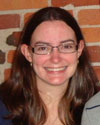
“Aligning Problem Set Assessment with Learning Goals”
The intention behind problem set assignments is to allow students to practice their skills, figuring out how to apply information from class to examples on their own. Frequently, however, students view them as miniature exams, where “failure” is imperfect performance – and our assessment reflects that perspective. In this project, I am exploring a means of assessment that focuses on students’ self-evaluation of and reflection on their problem set performance. By shifting the focus to self-evaluation, I hope to reframe problem sets as learning opportunities where it is okay to make mistakes and self-correct.

Stefanie Chambers, Professor of Political Science
“Diversity and Exclusion in the US Wine Industry”
The growing attention to diversity, equity and inclusion (DEI) efforts across a variety of American industries highlights the decades of exclusion people of color and women have experienced. Today we see banking giants such as Goldman Sachs launching programs to increase opportunities for Black women in business. Similarly, attention on the marginalization of women and people of color in the film industry has resulted in a range of new programs intended to open doors to groups who have encountered structural barriers. Like other sectors of the business world, the wine industry is attempting to welcome those previously excluded. The course I intend to develop will analyze DEI in the American wine industry. From vineyards and producers to distributers, marketers, retailers, and consumers, how is this industry creating opportunities for people of color and women? To what extent do structural, economic, political and social barriers continue to exclude these groups?
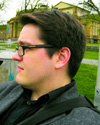 Jason Doerre, Visiting Assistant Professor of Language and Culture Studies
Jason Doerre, Visiting Assistant Professor of Language and Culture Studies
“Teaching the Holocaust and Memory into the Twenty-First Century and beyond”
Recently, the topic of the memory of the Holocaust has been appearing with frequency in the news that suggests a widespread erosion of general knowledge about the topic. This seems shocking given the gravity of the event and the meaning that the term “Holocaust” has carried for so long. My project entails finding new ways of teaching the Holocaust and the memory of the Holocaust but also in a way that directly speaks to students of the twenty-first century. Two central questions I seek to explore are how might teaching about the Holocaust be useful in enhancing student awareness of current issues concerning human rights and social justice? How can the United States learn from the German experience in publicly memorializing the Holocaust and “working through” the darker parts of its past?
Kelly Dugan, Visiting Assistant Professor of Classical Studies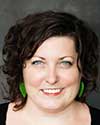
“Ancient Worlds in Our Community: Navigating Shifts and Growth in Teacher Training at Trinity College”
In the fall of 2022, I will be teaching a pedagogy course titled CLCV 103 Ancient Worlds in Our Community (AWOC). For this class, Trinity undergraduate students design and teach fun and engaging activities on ancient mythologies from around the world to local 6th graders at HMTCA. In my AWOC classrooms at Trinity, undergraduate students earn credit toward their degree as they learn theories and methodologies for teaching ancient studies today with an emphasis on equity in education.
AWOC is guided by principles of equity in education including, but not limited to, antiracist and antiableist curriculum design and teaching methods. Over the last two semesters, about 40 undergraduates at Trinity College have gained teacher training and on-site experience through AWOC. By June of 2022, nearly 140 middle school students currently at HMTCA will have completed the program this year.
The current 6th grade teacher educational co-director at HMTCA has recently accepted another position at a different school starting in the fall. Therefore, AWOC will be partnered with a new middle school teacher soon. This CTL fellowship will help me navigate this shift in educational partnership and redesign the program to be less personnel dependent so that future changes in personnel and growth of the program will be easier to address. My goal is to learn from other CTL Fellows and work together with the new middle school teacher to restructure and streamline the AWOC program during the 2022-2023 school year. I plan to create an improved framework and offer to the Trinity College community, including faculty, staff, and students, a functional and informative model for educational program design that can be applied in various ways across the many different fields of knowledge that we foster here.
 Kyle Evans, Visiting Assistant Professor of Mathematics
Kyle Evans, Visiting Assistant Professor of Mathematics
“Ungrading: Modernizing Assessment to Center Learning”
Many of us would likely agree that learning is or should be the goal of our courses but may not realize that traditional grading systems can often be detrimental to students’ learning. Traditional grading generally prioritizes performance, encourages competition over collaboration, penalizes mistakes along the way, emphasizes extrinsic over intrinsic motivation, increases anxiety, and contributes to unhealthy relationships between professors and students. Ungrading models seek to address these issues by providing consistent feedback rather than grades and giving the task of assigning a final grade to the students themselves. In this academic year, I have implemented ungrading in some of my courses and while I have experienced positive gains in student mindsets, this project aims to conduct research and utilize faculty across disciplines to enhance students’ metacognition and self-assessment. In addition, this project hopes to spark a larger conversation in which faculty look inward and evaluate their practices.
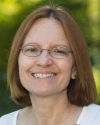 Deborah Fixel, Lecturer and Laboratory Coordinator in Engineering
Deborah Fixel, Lecturer and Laboratory Coordinator in Engineering
“Reimagining Engineering Computation and Analysis”
Engineering Computation and Analysis introduces computational engineering analysis using computer programming languages such as MATLAB and ANSI C. When learning to program, students must comprehend abstract concepts and master the syntax of languages that tend to differ from natural language. My first goal in this work is to research and understand the literature on the topic of teaching programming. The second goal is to diversify the methods I use in teaching the course and better engage students in their own learning. I intend to explore not solely the mechanics of programming but also various problems experienced by novice programmers as outlined in the literature. Subsequently, the goal is to employ various methods of delivery of the material in the classroom to address these learning challenges. I expect that this work will lead to revitalization of the course and an improved learning experience for the students as well as enhancing their learning in the course.
Michael Grubb, Assistant Professor of Psychology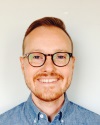
“Taking the Seminar to the Lab”
The primary goal for my CTL fellowship is to develop a research-focused lab course to accompany my upper-level seminar on the psychology and neuroscience of selective attention (PSYC 348). One learning objective in PSYC 348 is to have students gain first-hand experience with behavioral methods used to study attention. In past semesters, I have included a “research in action” week in which we measure our own Attentional Blink, a paradigm that is frequently used to index attentional control in the literature. Each unit in the seminar will have its own “research in action” corollary in the lab course. An additional goal of the lab course will be to introduce students to computational modeling and maximum likelihood estimation (MLE). To accomplish this goal, I will focus on teaching students how to manipulate and analyze data in R Studio throughout the course.
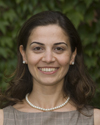 Kifah Hanna, Charles A. Dana Research Associate Professor of Language and Culture Studies
Kifah Hanna, Charles A. Dana Research Associate Professor of Language and Culture Studies
“Teaching Arabic Literature as World Literature”
“Teaching Arabic Literature as World Literature” adopts an affective approach to teaching contemporary cultural productions of the Arab world with an emphasis on enhancing students’ knowledge of the region by connecting it to pertinent global issues while simultaneously preserving its unique Arab features. In this project, I will develop effective classroom activities and assignments for my new course “Arab and Queer” that will allow a deeper and more meaningful students’ engagement with cross-cultural issues that are, for the most part, foreign to freshmen. These activities will prioritize using affect theory rather than historical knowledge in teaching topics such as traumas and identity politics.
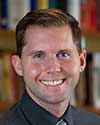 Alex Helberg, Visiting Assistant Professor in the Allan K. Smith Center for Writing and Rhetoric
Alex Helberg, Visiting Assistant Professor in the Allan K. Smith Center for Writing and Rhetoric
“Scaffolding Composition Process for Podcast Production”
Investigating the cognitive, physical, social, and emotional tasks that form the process of producing a piece of writing has been a perennial concern for scholars of rhetoric and composition. As new media herald the development of novel, often multi-modal genres of composition such as podcasts, traditional theories of how best to teach writing process must necessarily be challenged and updated for a digital age. With this fellowship project, I will create a unit plan for a digital writing class focused on creating a podcast episode as its final deliverable. To support this unit plan, I will develop a research-backed, rigorously tested scaffold for podcast composition and production that focuses on the core learning objectives of the unit, the skills students will be developing to accomplish them, and the composition process tasks that will help them iteratively hone their skills.
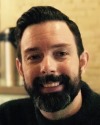 Tim Landry, Associate Professor of Anthropology and Religious Studies
Tim Landry, Associate Professor of Anthropology and Religious Studies
“Seeking Inclusive Pedagogy: Queering the Classroom”
Queer students at Trinity College are suffering. I’ve heard personally moving stories from students who have been rejected by their families; of queer students being marginalized in the classroom; and of students being made to feel less deserving of what Trinity College has to offer. As professors, one of the greatest ways we can impact the lives of our students is in our classroom. What we teach, and how we teach it, can help students of all backgrounds to feel heard, affirmed, and celebrated. As a 2022-23 CTL Fellow, I will strive for more affirming pedagogy in two primary ways: To begin, I will rework all my existing classes to ensure they are deliberately queer inclusive and affirming. This will be done by curating readings from a spectrum of queer identifying scholars and by adding both queer-focused and queer-sensitive assessment strategies. Secondly, I will design, “Queering Religion,” a new first year seminar experience, wherein students will explore the ways religion and queer folx transgress boundaries and challenge notions of “normality.” In so doing, my time as a CTL Fellow will allow me to develop ways to better center the concerns of queer students in my pedagogy and to add to queer visibility at Trinity College by providing a new curriculum that teaches the benefits, we all enjoy when human difference is not just tolerated – but celebrated.
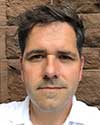 Michael C. Puljung, Assistant Professor of Neuroscience and Chemistry
Michael C. Puljung, Assistant Professor of Neuroscience and Chemistry
“Neuroscience through Biography”
Imposter syndrome is endemic in STEM. In an effort to reduce its pernicious impact and encourage students to self-identify as scientists, I am developing a course in which neuroscience topics will be approached first by engaging with the biographies of scientists who are experts in the topics studied. Unfortunately, existing biographical materials favor famous/established neuroscientists. This can serve to undermine student’s self-conception as scientists; comparing themselves to perceived scientific luminaries may bolster imposter syndrome, rather than tear it down. Sadly, historical biographies also tend to focus on white and primarily male scientists, inconsistent with our diverse student body. I propose to use my time and resources as a CTL fellow to acquire and create new biographical content concerning active neuroscientists at early and middle stages of their careers, with emphasis on groups that are traditionally underrepresented in STEM. To accomplish this task, I will focus on developing survey and interview skills and ultimately put these in practice to generate short biographies of a diverse group of current neuroscientists.
